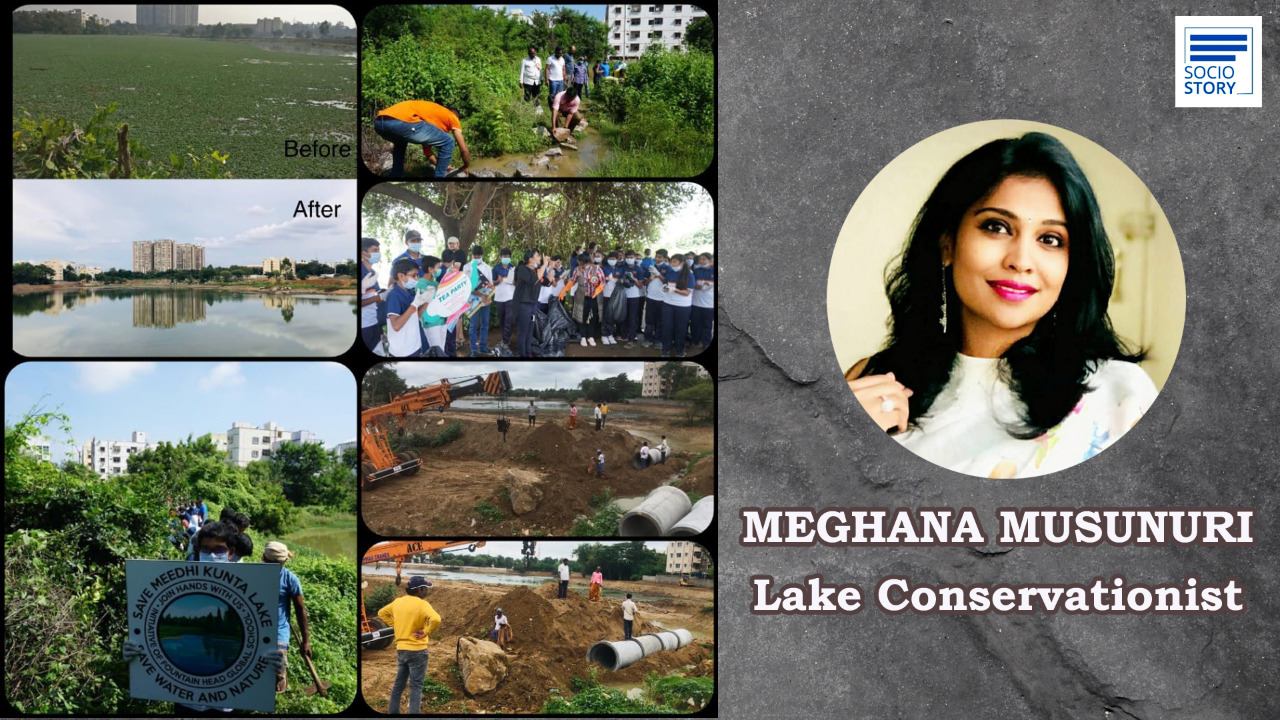From Child Rights discussion to revival of a huge lake, Meghana Musunuri believes in ‘Problem Based Learning’ among school children
Feb. 13, 2021, 9:34 p.m.

By:Reshma Jain
It all started as a simple Child Rights discussion in a school where Meghana Musunuri was discussing how children’s voices matter in saving or safeguarding natural resources like forests, lakes, rivers, mountains, etc. “When given a chance between them speaking and their actions speaking, being the smart generation that they are, the children chose both. They were clear to not be a part of the problem but to be a part of a solution,” recalls Musunuri.
In the heart of Hyderabad, the Meedikunta lake was plagued by several problems that needed to be tackled one at a time. From open defecation, debris strewn all over to no pathways to the lake, it had it all. It was covered with dense undergrowth and trash simultaneously with underground water pollution. Since it was used as a dumping ground equally by the society and industries, it led to becoming a breeding ground for mosquitoes and harmful viruses. The rainwater inlets were choked while sewage inlets were opened into the lake. Overall, the lake required a helping hand to prevent further encroachment.
Leading the way, Meghana Musunuri, an educationist, said, “Our Problem Based Learning (PBL) projects have a student-centered approach in which students learn about a subject by working in groups to solve an open-ended problem. This problem is what drives the motivation and the learning. The Meedikunta Lake (urban lake) revival stands as a true example for this. This project created many avenues for students to learn by gathering necessary information and explore the issue. They learned to identify the problem, new concepts, principles and skills.”
The revival of Meedikuta lake had started in 2019 and within a few months, a social bund on all four sides and proper boundaries along with jogging and cycling tracks were established. A clear path surrounding the lake was made, with conventional sanitation standards. They cleared the undergrowth, stopped open defecation, removed illegal bore-wells, and encroachments. They also unclogged the sluice, constructed rainwater inlets and a weir.
“The children accompanied by teachers removed all the duckweed, medical waste, construction dumps and plastic waste from and around the lake. We diverted most of the sewage and residential waste out of the lake. We also took up measures to improve the quality of water, planted fruit and flower bearing tree saplings to restore the biodiversity of the lake. Even amidst the lockdown protocols and a deadly virus spreading terror, the committed team persisted on the completion of Meedikunta lake revival,” said Musunuri by adding that today, the beauty of the lake lies in the twittering of birds, the rippling of mighty waters and the sweet breathings of flora and fauna.
Sharing one of her experiences, Musunuri said, “While cleaning the lake path and building the social bund, the maids who used to use the path said that they were robbed and molested previously. Now that it's cleaned and accessible, it would be safe to use the path. The students felt happy and we instilled the confidence that they can achieve anything if they work together.”
Ideation, implementation, accountability, auditing and performance review helped improve the life skills in the students. Between problem identification and solution, they could create a complete hands-on experience for learning. For the first time in the history of our country, school children as young as 4 years participated in the complete cycle of reviving an urban lake.
Not so long ago, we used to live by the lakes as that was the only source of water for our daily needs. Now we depend on other sources and neglect the well-being of the lakes and this will impact us to a great extent. Sharing her view on the status of lakes in India, lake conservationist Musunuri said that the urban lakes are in a pathetic condition. “The government should build proper sewage systems so that these lakes are not used as sewage outlets. I feel we should all take this as our own responsibility not to dump trash around these water bodies. It has to be a lifestyle change where we should take the responsibility to save these lakes for the future generations,” shared the educationist.
Speaking on the future plans, Musunuri, said, “The need of the hour is to transform education for human flourishing. A good school can also contribute in building a good neighbourhood. We need to empower this generation to act on local issues to solve global problems. Experiencing the joy through the art of giving from a tender age plays a major role in moulding children’s character."
“As an education futurist, I want to create a space for the next generations to learn without fear, to face the highly technical world through student centric approaches such as blended learning and problem-based learning to acquire the essential life skills, to prepare them to face the future both technically and emotionally,” concluded Musunuri.
Important : If you are making an impact in the world, Please send us your story at : sociostoryfoundation@gmail.com and we will try to cover you.